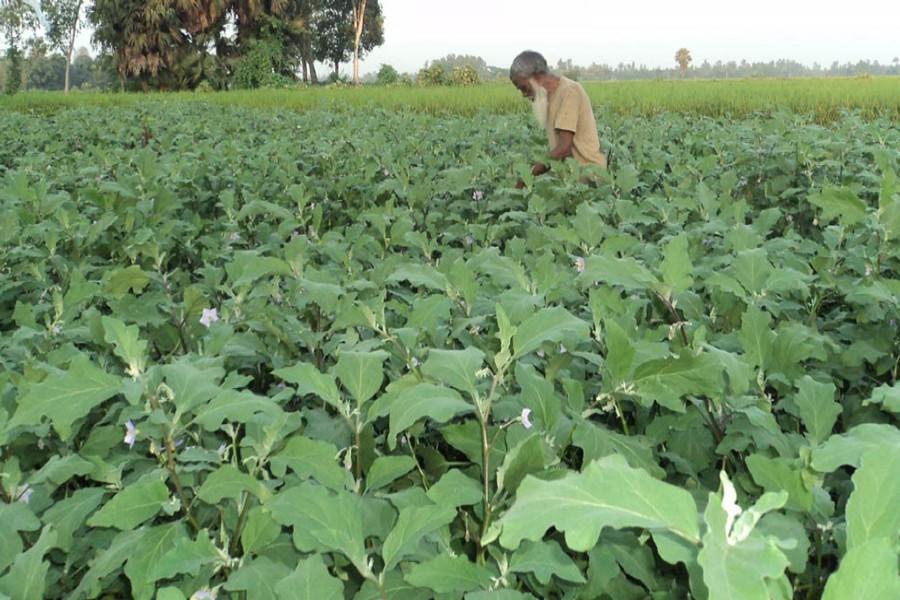Pest infestation, especially invasion of 'shoot borer', is much lower in Bt brinjal than other traditional varieties, a latest study showed.
Bt brinjal is the first genetically modified (GM) crop ever developed in Bangladesh.
Leaf-eating beetles were found 47.1 per cent of plants in case of Bt brinjal when it was 63.7 per cent for other varieties, it said.
The study was disclosed on Wednesday at a workshop styled 'Agricultural transformation of Bangladesh: Evidence on biotechnology and nutrition-sensitive agriculture' at a city hotel.
The Bangladesh Policy Research and Strategy Support Programme of the International Food Policy Research Institute (IFPRI), the United States Agency for International Development (USAID) and agriculture ministry co-hosted the event.
The research titled 'Impacts of Bt Brinjal Technology in Bangladesh', conducted jointly by IFPRI and agriculture ministry, showed shoot borer's invasion 10.6 per cent of Bt brinjal (Bt-4 variety) plants.
The rate of such infestation was 90 per cent in traditional varieties, it said.
IFPRI country representative Dr Akhter Ahmed presented the study, showing presence of pests like mite, mealy or leaf wing bug in 35.7 per cent of Bt brinjal plants.
It was 46.7 per cent in traditional crops, according to the findings of the study.
The study was conducted in 2017-2018 among more than 1,200 farmers in Rangpur and Rajshahi divisions.
Another joint study found that Bt brinjal farmers had to use pesticide 10-15 times while non-GM brinjal farmers sprayed pesticide 16-25 times.
Speaking as the chief guest, agriculture minister Dr Muhammad Abdur Razzaque put special emphasis on safe and nutritious food through using modern biotechnology.
He said agro-production has increased, but the farming community is not getting fair prices for their produce, thus getting discouraged to stay in agriculture.
To meet the growing needs for food and face future food shortages, new varieties should be developed and biotechnology should be adopted, Dr Razzaque said.
He said the government has highlighted great importance that the new varieties do not harm the environment and the human body as well.
Krishi Gobeshona Foundation executive director Dr Wais Kabir said Bt [Bacillus thuringiensis] technology was adopted in Bangladesh when India and the Philippines deserted using it.
But he cautioned that Bt gene could be pollinated to other crops from Bt brinjal if proper segregation is not maintained.
"Bt brinjal is being marketed here without labelling, depriving people their right to know and choice," said Dr Kabir, also former executive chairman of the Bangladesh Agricultural Research Council.
Agriculture secretary Md Nasiruzzaman said: "We always found some rebels against newer technologies."
He said opposition to Bt brinjal could force farmers to buy seed from companies, adding: "Buying quality seed is necessary to maintain high production".
Mr Zaman said many people also opposed hybrid when it was introduced in the country last century.
BRAC Institute of Governance and Development executive director Dr Imran Matin said governance and regulation was imperative in using Bt technology.
Adaptation of biotechnology was to protect the future generation from the challenges of ensuring safe and nutritious foods, he added.
Citing from a study, USAID Bangladesh acting mission director Zeinah Salahi said the percentage of families living in poverty and the number of children suffering from chronic malnutrition has decreased significantly here in the past four years.
"There have been substantial improvements in dietary diversity for women and children as well as an increase in women's empowerment," she cited.
Agricultural Policy Support Unit director general (DG) Dr Md Abdur Rauf and Directorate of Agriculture Extension DG Mir Nurul Alam spoke at the event.
Bangladesh Agricultural Research Institute (BARI) DG Abul Kalam Azad and Bangladesh Institute of Development Studies research fellow Dr Nazneen Ahmed also spoke.
The India-based Maharashtra Hybrid Seed Company (Mahyco) used Bt cry1Ac gene to transform brinjal to be resistant to shoot borer (EFSB) pest.
The tech was transferred to the BARI through public-private partnership between Mahyco, Cornell University, Sathguru Management Consultants, and USAID under the Agricultural Biotechnology Support Project-II cooperative agreement.
The BARI subsequently introgressed the gene into nine Bangladeshi eggplant lines. After nine years of field research, it was commercially released in 2014.


